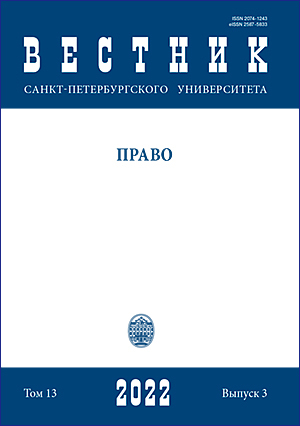Legalization of marijuana use in comparative criminal legislation
DOI:
https://doi.org/10.21638/spbu14.2022.312Аннотация
In light of the rapidly shifting legislation regarding the legalization of marijuana use, the popular notion seems to be that marijuana is a harmless pleasure, access to which should not be regulated or considered illegal. World Health Organization recommended to delete cannabis and cannabis resin from Schedule IV of the UN Single Convention on Narcotic Drugs (1961), but to maintain it in Schedule I of the 1961 Convention. The UN Commission on Narcotic Drugs decided by 27 votes to 25 and with one abstention to follow this recommendation. Тhere is the issue of how much this decision will affect the legalization of marijuana in the world. In the paper are analyzed two legislation of the Anglo-Saxon legal system, which supported this initiative (Canada and USA) and legislation of Euro-Continental legal area (Russia) that did not accept the reclassifying of cannabis from the 1961 Convention. Author has compared the Canadian code with Uruguayan, and the U. S. bill with the Mexican legislation, because Mexican bill does not provide the full legalization of marijuana use. In the Russian Federation, all deeds related to narcotic drugs, which were committed on a significant, large, and an especially large scale, and also all acts coherent to traffic of narcotic drugs, regardless of its scale, are regulated by Criminal Code of the Russian Federation. Otherwise, there will be applied an administrative law.
Ключевые слова:
criminal law, legalization, drug-related criminality, marijuana, general authorization
Скачивания
Библиографические ссылки
Загрузки
Опубликован
Как цитировать
Выпуск
Раздел
Лицензия
Статьи журнала «Вестник Санкт-Петербургского университета. Право» находятся в открытом доступе и распространяются в соответствии с условиями Лицензионного Договора с Санкт-Петербургским государственным университетом, который бесплатно предоставляет авторам неограниченное распространение и самостоятельное архивирование.






